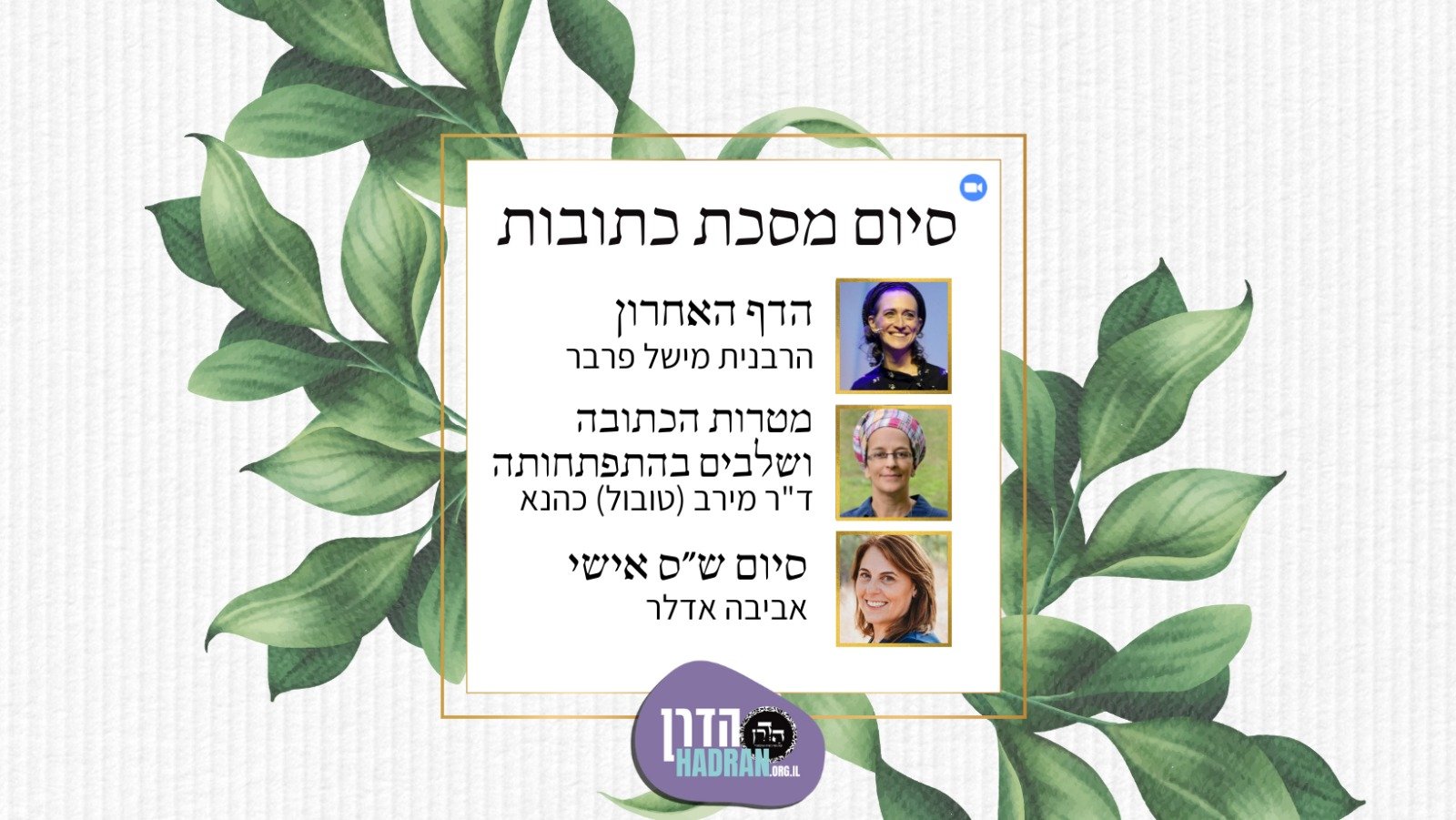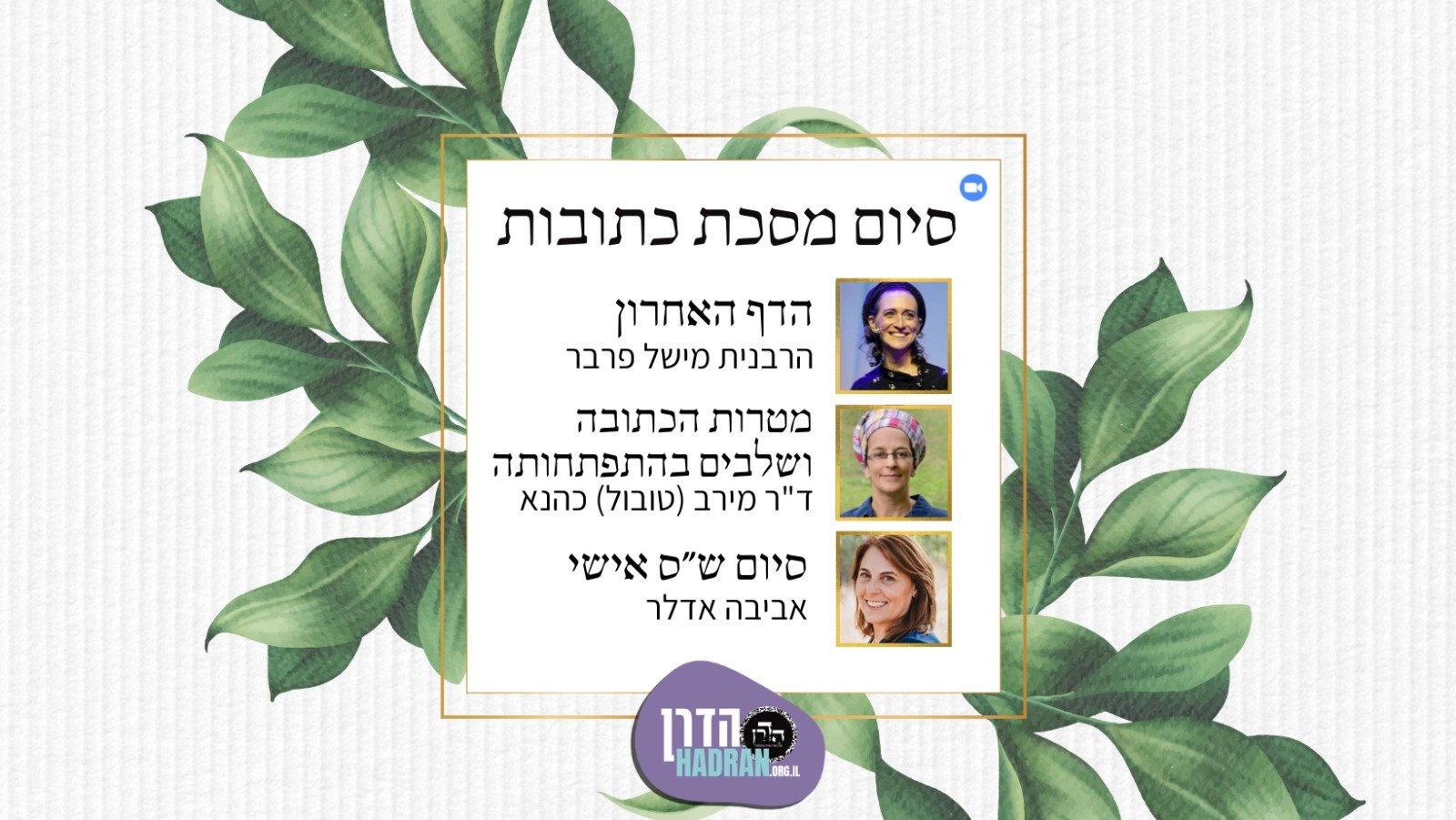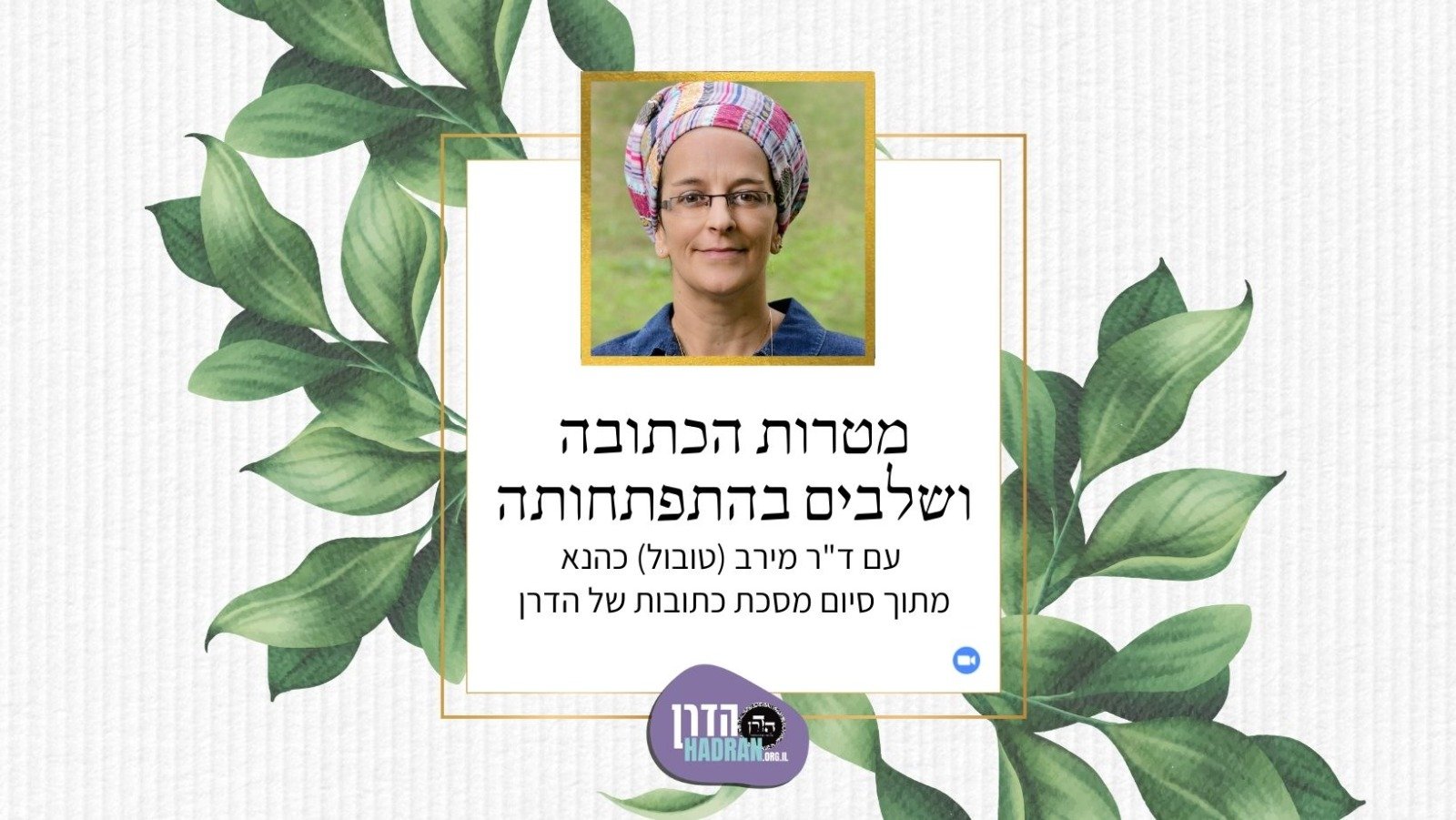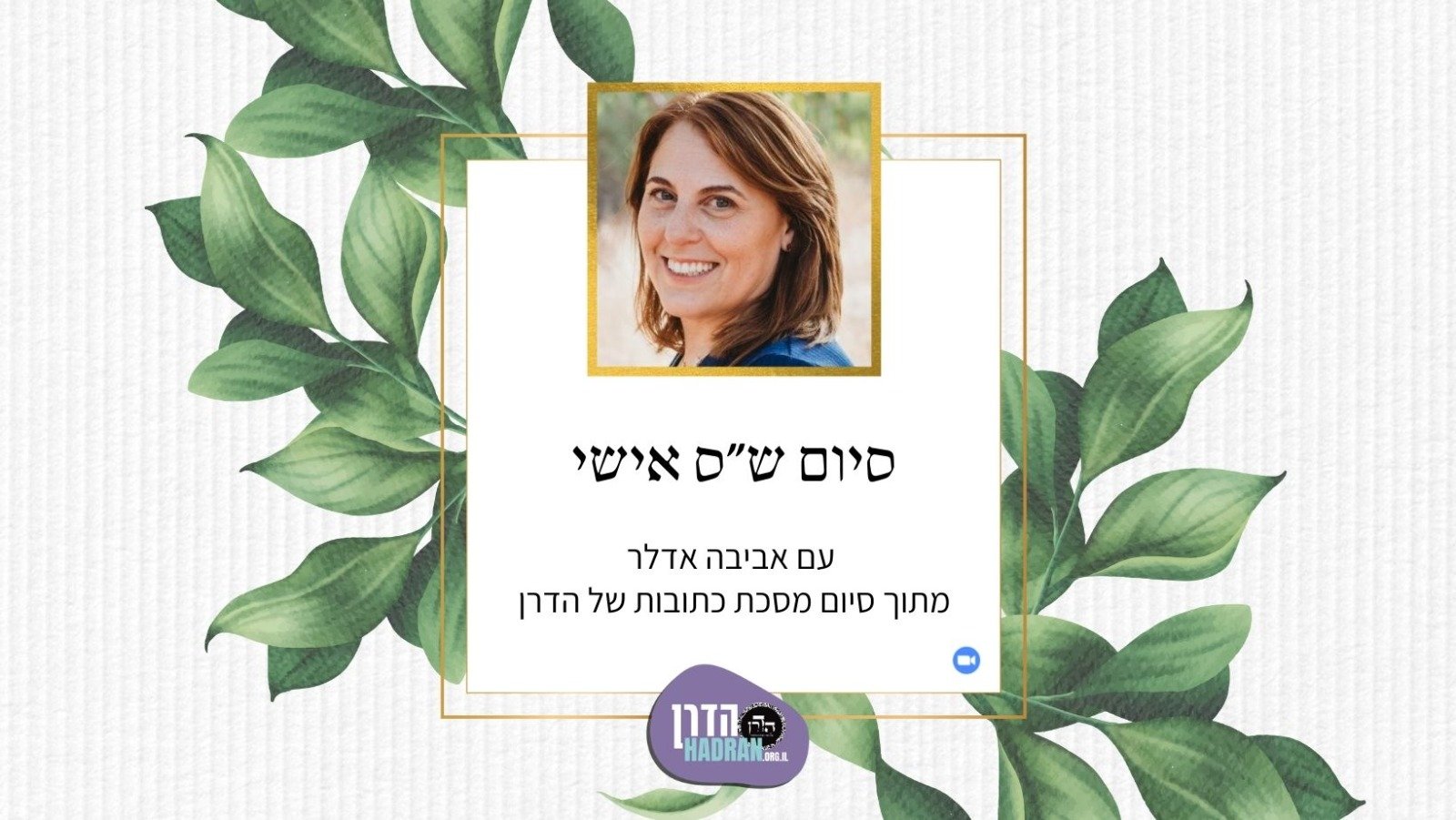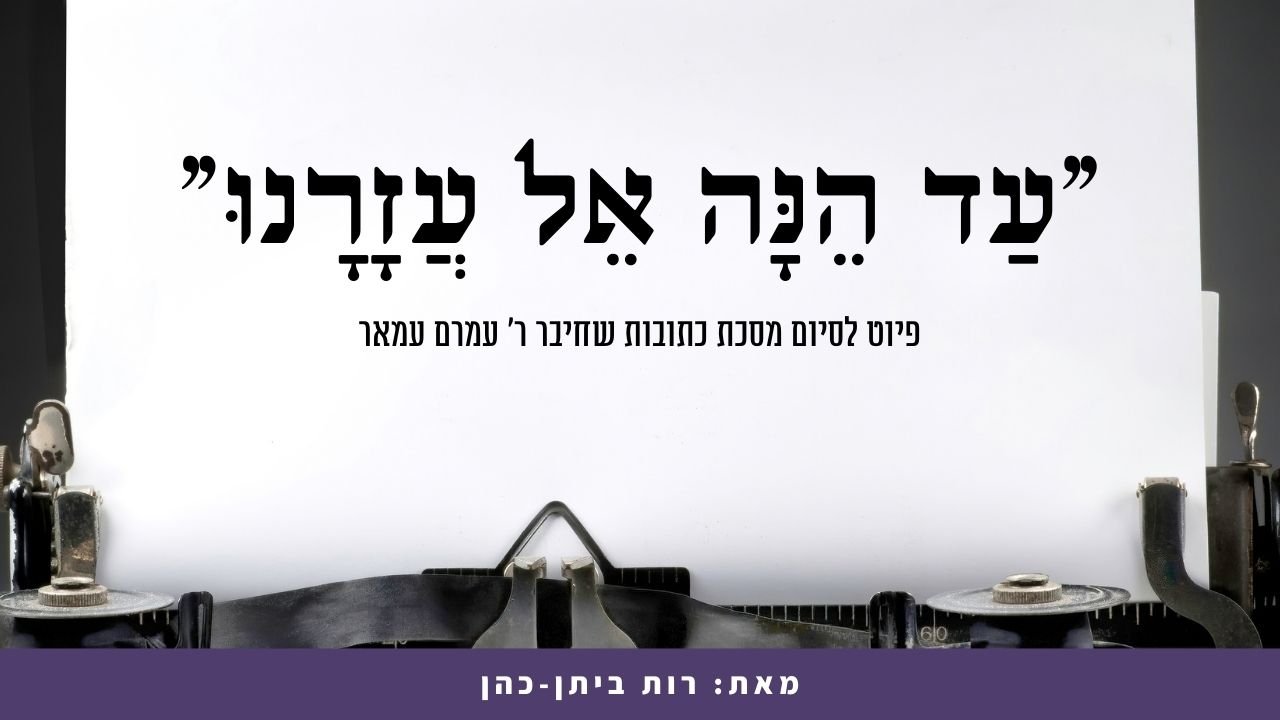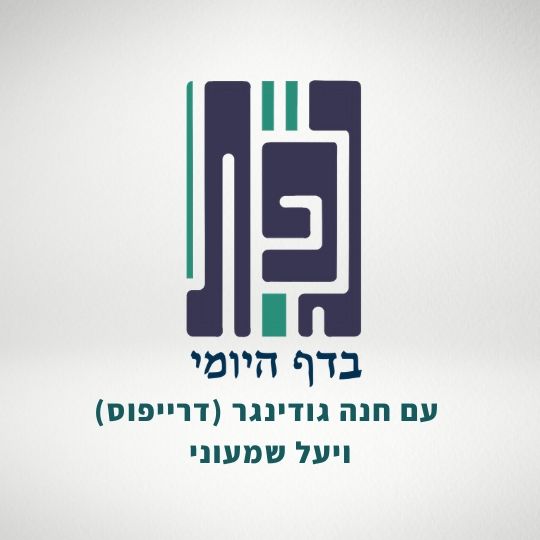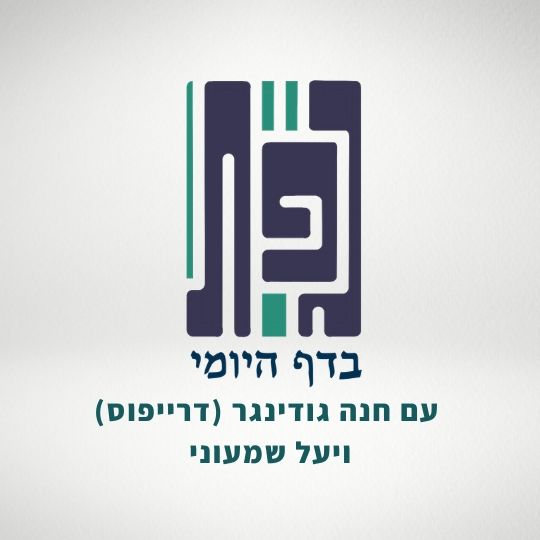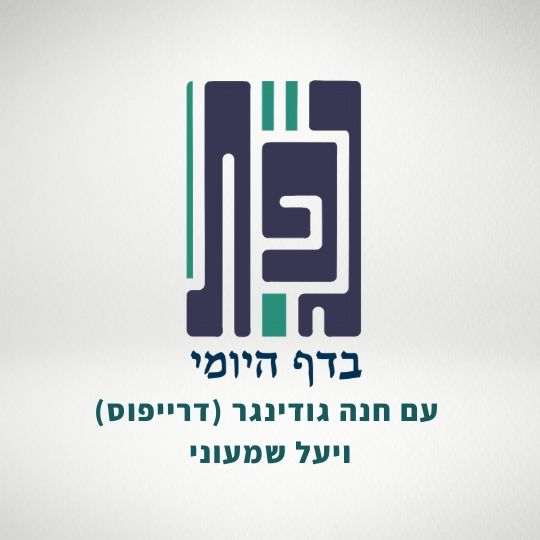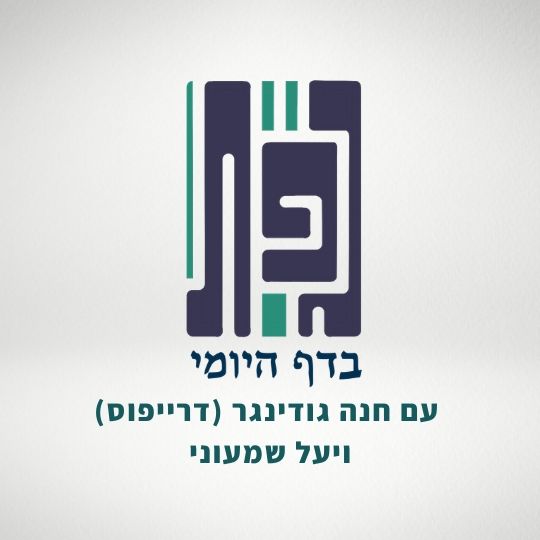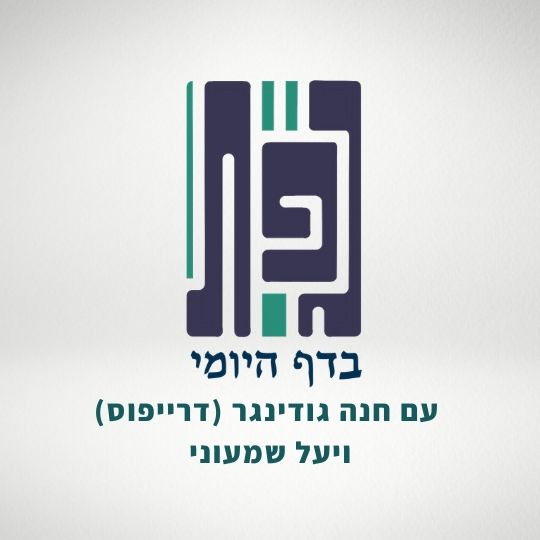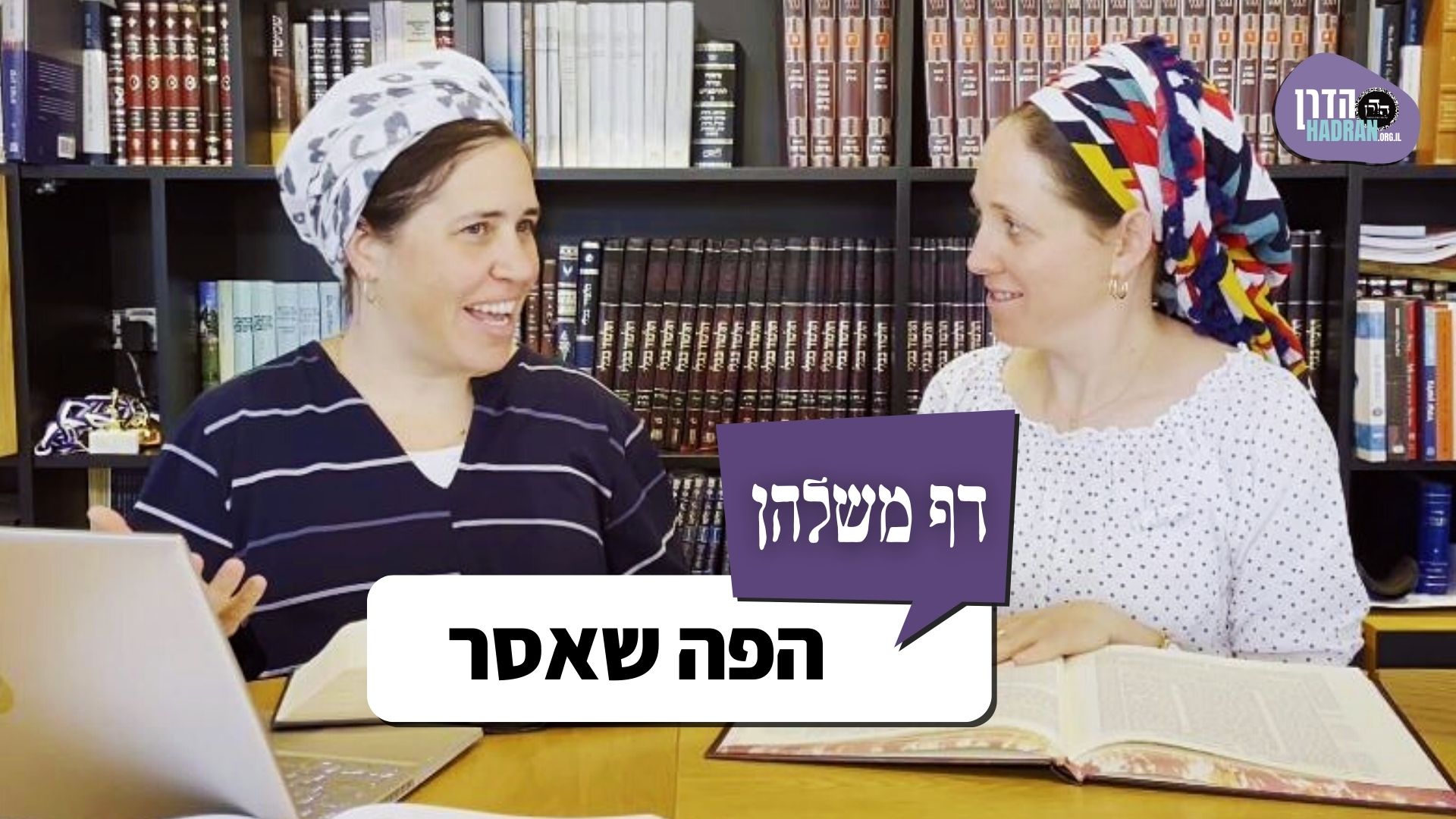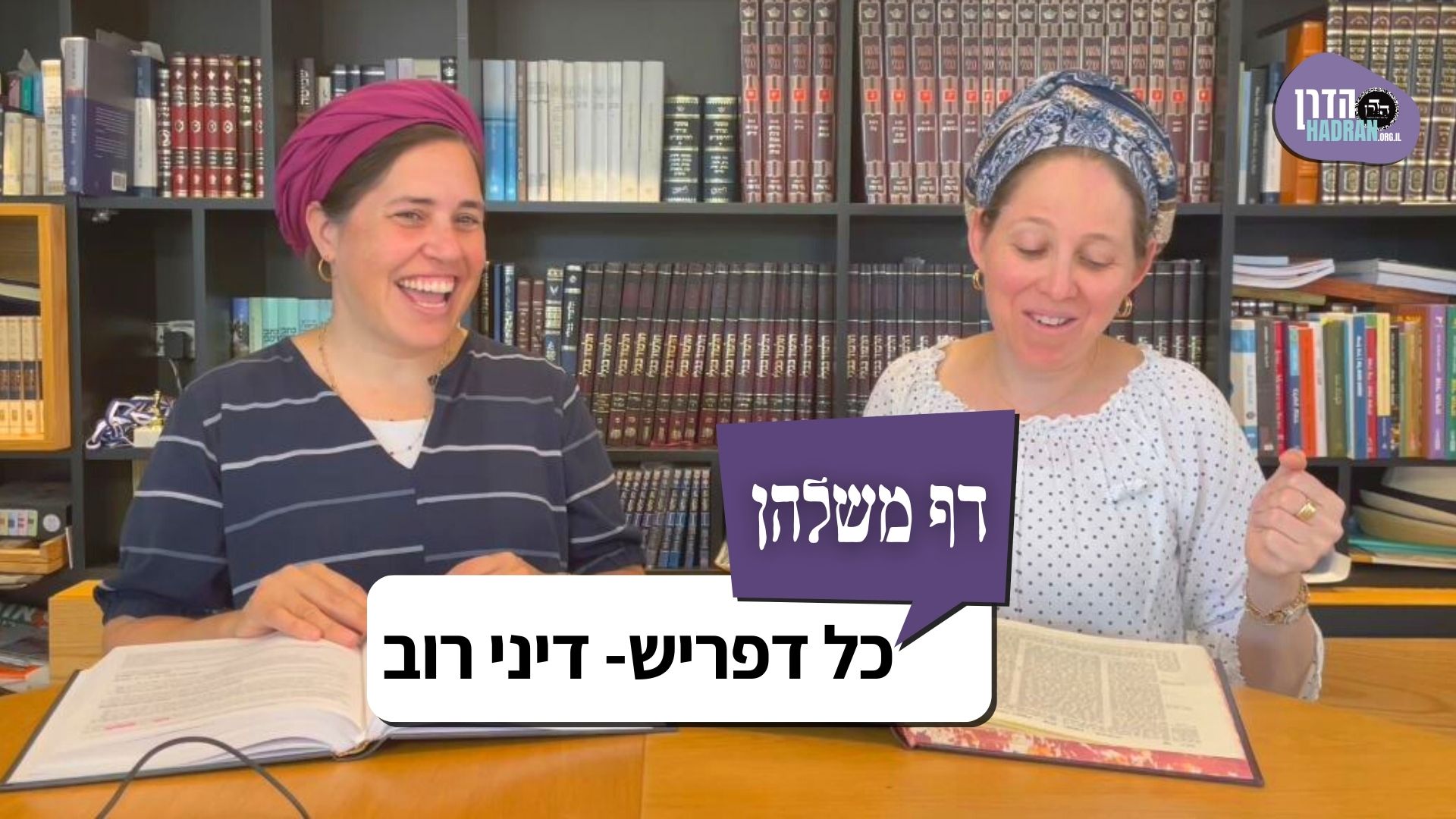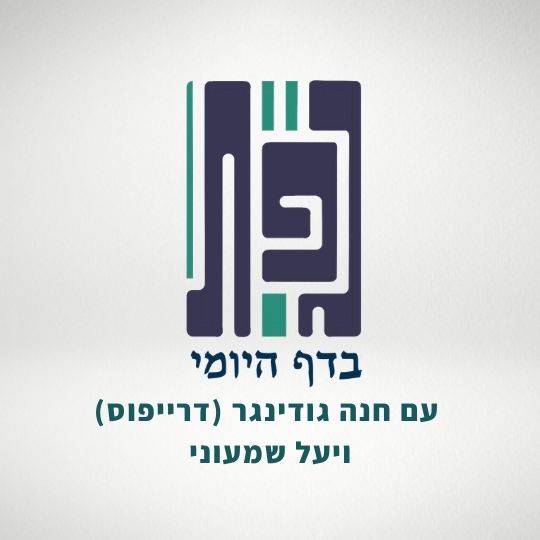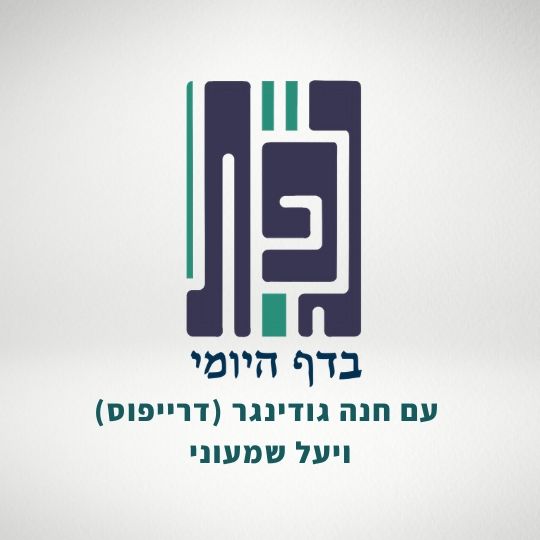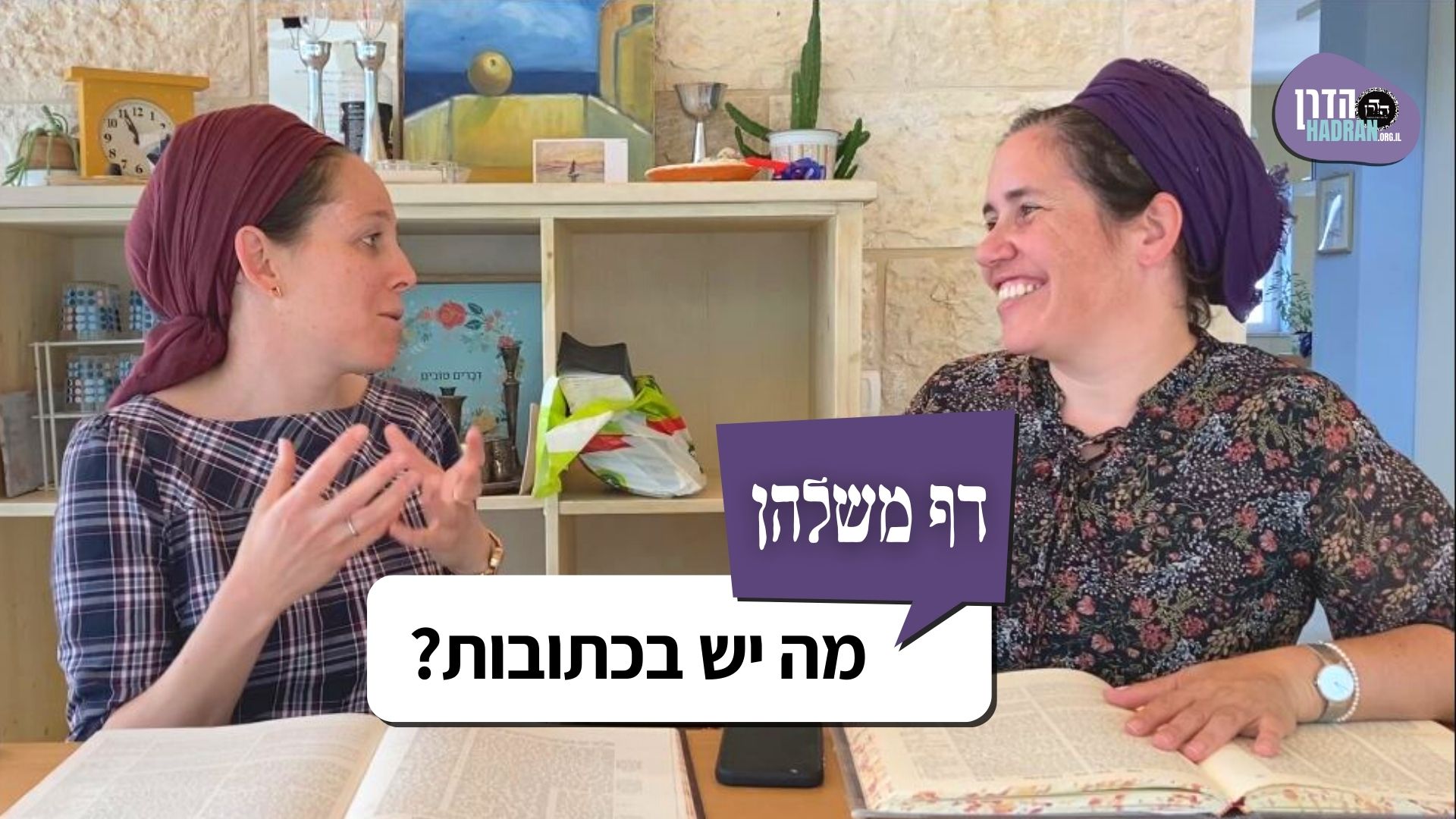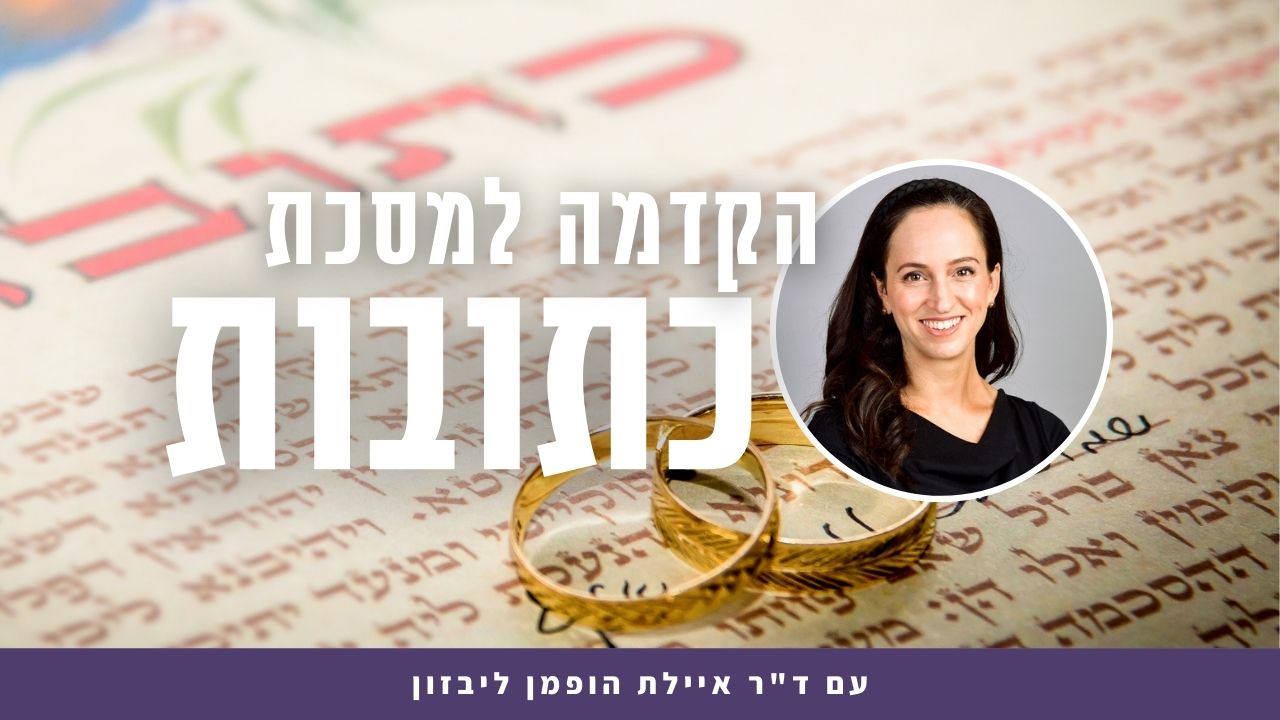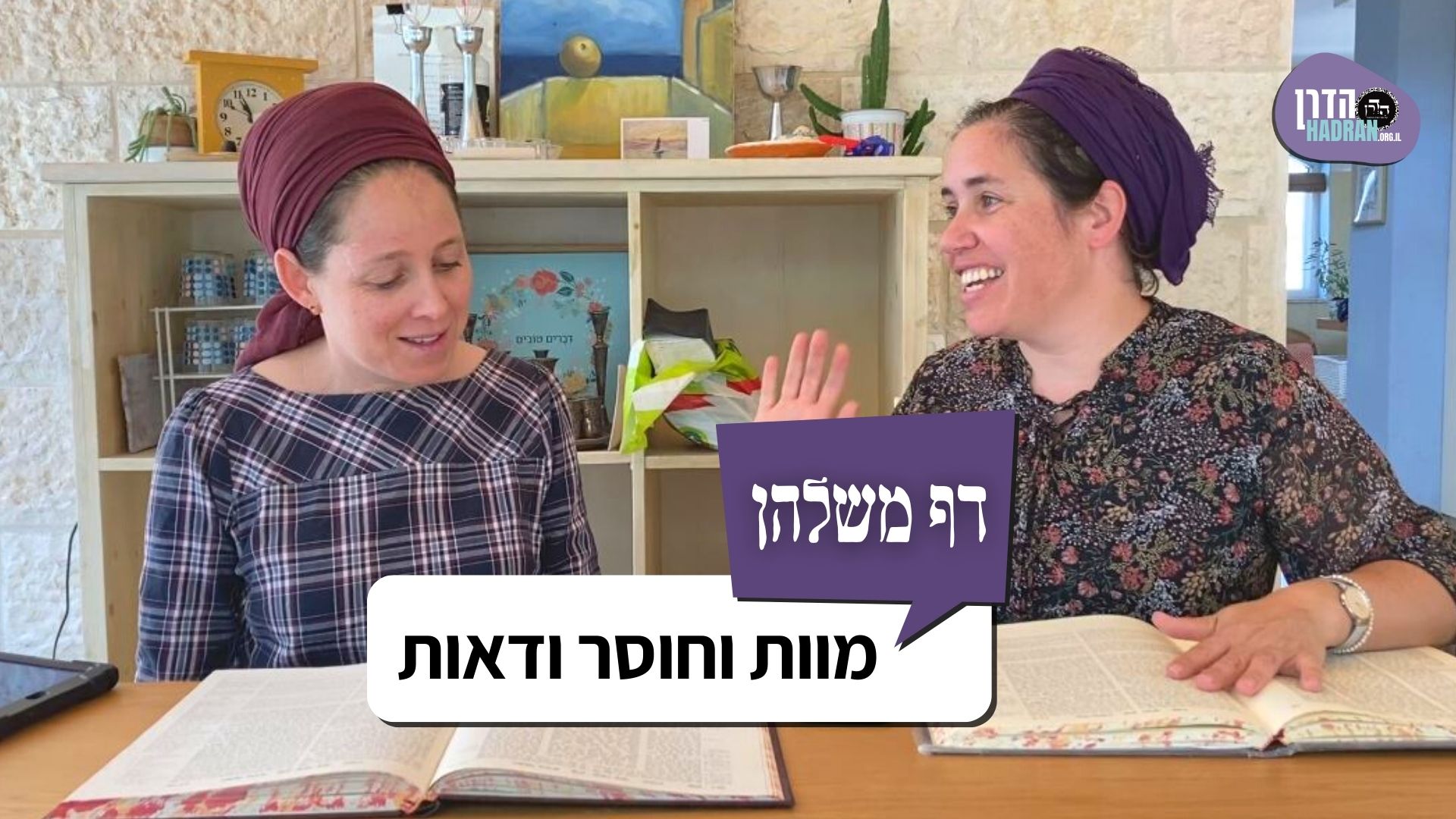האם אסור או מותר לקיים יחסים בפעם הראשונה בליל שבת? ישנן שתי גרסאות שונות לגבי מה שפסקו רב ושמואל בעניין – אחד התיר ואחד אוסר. אם רב פוסק כרבי יהודה שאוסר דבר שאינו מתכוון, כיצד הוא מתיר (לפי האומרים שהוא מתיר)? חייב להיות שהוא סבור שמדובר במקלקל ופוסק כר’ יהודה שמקלקל בחבורה פטור. מובאים מספר מקורות נגד שמואל (שסובר כרבי שמעון שדבר שאינו מתכוון מותר) לפי האומרים ששמואל אסר יחסים בליל שבת. המקור הראשון הוא משנה בנידה סד:, שמצביע על כך שאפשר לקיים יחסים בליל שבת גם אם יש סבירות שהיא עלולה לדמם מדם בתולים. רבא פותר את זה כי זה מקרה שבבר בעל ולכן לא בטוח שתדמם שוב. השאלה השנייה היא מפטור החתן מקריאת שמע הנמשך עד מוצאי שבת במקרה שעדיין לא היו ביניהם יחסים. למה שאדם יהיה פטור בשבת אלא אם כן יוכל לקיים יחסים? רבא ואביי מתרצים כל אחד בדרך אחרת. נשאלת שאלה שלישית ממקרה של פתיחת פצע בשבת המותר – מדוע אין זה דומה לקריעת קרום הבתולים?
הלימוד השבוע מוקדש לזכות ולשלום הַיְימׇנוֹט אֱמוּנָה בַּת באנצ’י (קָסָאוּ) בת 11 שנעלמה במקום מגוריה בצפת, לפני שנתיים, ביום ט”ז אדר תשפ”ד (25.2.24), ולא נודעו עקבותיה.
הלימוד השבוע מוקדש למען ביטחון המדינה, החיילים והאזרחים, ולמען חירותו של העם האיראני. שנזכה בקרוב שיתקיים בנו הפסוק: "לַיְּהוּדִים הָיְתָה אוֹרָה וְשִׂמְחָה וְשָׂשֹׂן וִיקָר”.
הלימוד השבוע מוקדש לזכות וְלִשְׁלוֹם הָיימָנוֹט אֱמוּנָה בַּת באנצ’י (קָסָאוּ), בת 11 שנעלמה במקום מגוריה בצפת, לפני שנתיים, ביום ט”ז אדר תשפ״ד (25.2.24), ולא נודעו עקבותיה. אנו מתפללים שֶׁתִּמָּצֵא וְתוּשַׁב לביתה במהרה!
רוצה להקדיש שיעור?

הלימוד השבוע מוקדש לזכות ולשלום הַיְימׇנוֹט אֱמוּנָה בַּת באנצ’י (קָסָאוּ) בת 11 שנעלמה במקום מגוריה בצפת, לפני שנתיים, ביום ט”ז אדר תשפ”ד (25.2.24), ולא נודעו עקבותיה.
הלימוד השבוע מוקדש למען ביטחון המדינה, החיילים והאזרחים, ולמען חירותו של העם האיראני. שנזכה בקרוב שיתקיים בנו הפסוק: "לַיְּהוּדִים הָיְתָה אוֹרָה וְשִׂמְחָה וְשָׂשֹׂן וִיקָר”.
הלימוד השבוע מוקדש לזכות וְלִשְׁלוֹם הָיימָנוֹט אֱמוּנָה בַּת באנצ’י (קָסָאוּ), בת 11 שנעלמה במקום מגוריה בצפת, לפני שנתיים, ביום ט”ז אדר תשפ״ד (25.2.24), ולא נודעו עקבותיה. אנו מתפללים שֶׁתִּמָּצֵא וְתוּשַׁב לביתה במהרה!
העמקה
רוצה להבין מה באמת קורה מתחת לפני השטח של הסוגיה?
שיעורים, פודקאסטים והרחבות של מיטב המורות שלנו יפתחו לך עוד זוויות וכיווני חשיבה.
חדשה בלימוד הגמרא?
זה הדף הראשון שלך? איזו התרגשות עצומה! יש לנו בדיוק את התכנים והכלים שיעזרו לך לעשות את הצעדים הראשונים ללמידה בקצב וברמה שלך, כך תוכלי להרגיש בנוח גם בתוך הסוגיות המורכבות ומאתגרות.
פסיפס הלומדות שלנו
גלי את קהילת הלומדות שלנו, מגוון נשים, רקעים וסיפורים. כולן חלק מתנועה ומסע מרגש ועוצמתי.
כתובות ו
אוֹ הֲלָכָה כְּרַבִּי שִׁמְעוֹן.
Or, is the halakha in accordance with the opinion of Rabbi Shimon, who ruled that one who is destructive in causing a wound on Shabbat is liable if he did so intentionally?
(אִיתְּמַר:) בְּבֵי רַב אָמְרִי: רַב שָׁרֵי וּשְׁמוּאֵל אָסַר. בִּנְהַרְדְּעָא אָמְרִי: רַב אָסַר וּשְׁמוּאֵל שָׁרֵי. אָמַר רַב נַחְמָן בַּר יִצְחָק, וְסִימָנָיךְ: אֵלּוּ מְקִילִּין לְעַצְמָן וְאֵלּוּ מְקִילִּין לְעַצְמָן.
With regard to the halakha of engaging in intercourse with one’s virgin bride on Shabbat, it was stated that in the school of Rav they say: Rav permitted doing so and Shmuel prohibited doing so. In Neharde’a, where Shmuel lived, they say: Rav prohibited doing so and Shmuel permitted doing so. Rav Naḥman bar Yitzḥak said: And your mnemonic is: These are lenient with regard to themselves, and those are lenient with regard to themselves. Each attributes the lenient ruling to the local halakhic authority, whose ruling is binding in that locale.
וְרַב שָׁרֵי? וְהָאָמַר רַב שִׁימִי בַּר חִזְקִיָּה מִשְּׁמֵיהּ דְּרַב: הַאי מְסוֹכַרְיָא דְּנַזְיָיתָא — אָסוּר לְהַדּוֹקַהּ בְּיוֹמָא טָבָא!
The Gemara asks: And did Rav permit engaging in intercourse in those circumstances? But didn’t Rav Shimi bar Ḥizkiyya say in the name of Rav: In the case of this cloth stopper of a barrel [nazyata], it is prohibited to insert it tightly in the spout of the barrel on a Festival, because in the process liquid will be squeezed from the cloth, and squeezing liquids is prohibited on Shabbat and Festivals. Apparently, Rav prohibits even unintentional actions.
בְּהָהוּא אֲפִילּוּ רַבִּי שִׁמְעוֹן מוֹדֶה, דְּאַבָּיֵי וְרָבָא דְּאָמְרִי תַּרְוַיְיהוּ: מוֹדֶה רַבִּי שִׁמְעוֹן בִּ״פְסִיק רֵישֵׁיהּ וְלָא יְמוּת״.
The Gemara answers: In the case of the barrel, even Rabbi Shimon concedes, as it is Abaye and Rava who both say: Rabbi Shimon concedes in the case of: Cut off its head and will it not die, i.e., a case that involves inevitable consequences like the decapitation of an animal, that the action is forbidden. Here, the liquid will inevitably be squeezed from the cloth.
וְהָא אָמַר רַב חִיָּיא בַּר אָשֵׁי אָמַר רַב: הֲלָכָה כְּרַבִּי יְהוּדָה. וְרַב חָנָן בַּר אַמֵּי אָמַר שְׁמוּאֵל: הֲלָכָה כְּרַבִּי שִׁמְעוֹן. וְרַב חִיָּיא בַּר אָבִין מַתְנֵי לַהּ בְּלָא גַּבְרֵי, רַב אָמַר: הֲלָכָה כְּרַבִּי יְהוּדָה, וּשְׁמוּאֵל אָמַר: הֲלָכָה כְּרַבִּי שִׁמְעוֹן.
The Gemara asks: But didn’t Rav Ḥiyya bar Ashi say that Rav said with regard to unintentional acts: The halakha is in accordance with the opinion of Rabbi Yehuda, and Rav Ḥanan bar Ami said that Shmuel said: The halakha is in accordance with the opinion of Rabbi Shimon. And Rav Ḥiyya bar Avin taught these rulings directly, without citing additional men who transmitted them. Rav said: The halakha is in accordance with the opinion of Rabbi Yehuda, and Shmuel said: The halakha is in accordance with the opinion of Rabbi Shimon. How then did Rav permit intercourse with one’s virgin bride on Shabbat?
לְעוֹלָם רַב כְּרַבִּי יְהוּדָה סְבִירָא לֵיהּ, לְהַךְ לִישָּׁנָא דְּאָמַר דָּם מִיפְקָד פְּקִיד — מְקַלְקֵל הוּא אֵצֶל הַפֶּתַח. לְהָךְ לִישָּׁנָא דְּאָמַר דָּם חַבּוֹרֵי מִיחַבַּר — מְקַלְקֵל בְּחַבּוּרָה הוּא.
The Gemara answers: Actually, Rav holds in accordance with the opinion of Rabbi Yehuda. According to that version that said that the blood is pooled, he is destructive vis-à-vis the opening. According to that version that said that blood is flowing through blood vessels attached to the body, he is destructive in causing the wound, and Rabbi Yehuda concedes that it is permitted.
מֵתִיב רַב חִסְדָּא: תִּינוֹקֶת שֶׁלֹּא הִגִּיעַ זְמַנָּהּ לִרְאוֹת וְנִשֵּׂאת, בֵּית שַׁמַּאי אוֹמְרִים: נוֹתְנִין לָהּ אַרְבָּעָה לֵילוֹת, וּבֵית הִלֵּל אוֹמְרִים: עַד שֶׁתִּחְיֶה הַמַּכָּה.
Rav Ḥisda raised an objection from a mishna (Nidda 64b). With regard to a young girl whose time to see the flow of menstrual blood has not arrived, as she has not yet reached puberty, and she married, Beit Shammai say: One gives her four nights during which she may engage in intercourse, as any blood is attributed to the ruptured hymen. Beit Hillel say: There is no limit. Rather, any blood she sees is attributed to the ruptured hymen until the wound heals.
הִגִּיעַ זְמַנָּהּ לִרְאוֹת וְנִשֵּׂאת, בֵּית שַׁמַּאי אוֹמְרִים: נוֹתְנִין לָהּ לַיְלָה הָרִאשׁוֹן. וּבֵית הִלֵּל אוֹמְרִים: עַד מוֹצָאֵי שַׁבָּת, אַרְבָּעָה לֵילוֹת.
If, however, her time to see the flow of menstrual blood has arrived, as she has reached the age of puberty, even if she has not yet menstruated, and she married, Beit Shammai say: One gives her the first night, during which the blood is attributed to the wound. Thereafter, the blood is presumed to be menstrual blood, and she is forbidden to her husband. Beit Hillel say: One gives her from Wednesday, the day designated for marriage of a virgin, until the conclusion of Shabbat, four nights. During that period, any blood is attributed to the wound, and she is permitted to her husband.
מַאי לָאו: דְּאִי לֹא בָּעַל, מָצֵי בָּעֵיל אֲפִילּוּ בְּשַׁבָּת. אָמַר רָבָא: לָא, לְבַר מִשַּׁבָּת. אֲמַר לֵיהּ אַבָּיֵי: וְהָא ״עַד מוֹצָאֵי שַׁבָּת אַרְבָּעָה לֵילוֹת״ קָתָנֵי? אֶלָּא, אָמַר רָבָא: כְּשֶׁבָּעַל.
What, is it not referring to a case where if he did not yet engage in full-fledged intercourse, i.e., rupturing the hymen, with his bride, he may engage in full-fledged intercourse with her even on Shabbat? Apparently, it is permitted to engage in intercourse with a virgin on Shabbat. Rava said: No, it is referring to any other day except for Shabbat. Abaye said to him: But isn’t it taught: Until the conclusion of Shabbat, four nights? Four nights from Wednesday until the conclusion of Shabbat includes Shabbat. Rather, Rava said: It is referring to a case where he engaged in full-fledged intercourse with his bride before Shabbat. Therefore, there is no concern lest he cause a wound on Shabbat.
אִי כְּשֶׁבָּעַל, מַאי קָא מַשְׁמַע לַן? קָא מַשְׁמַע לַן דִּשְׁרֵי לְמִיבְעַל בְּשַׁבָּת, כְּדִשְׁמוּאֵל. דְּאָמַר שְׁמוּאֵל: פִּירְצָה דְּחוּקָה מוּתָּר לִיכָּנֵס בָּהּ בְּשַׁבָּת, וְאַף עַל פִּי שֶׁמַּשִּׁיר צְרוֹרוֹת.
However, if it is referring to a case where he already engaged in intercourse, what is the tanna teaching us when he says that it is permitted to have intercourse with her even on Shabbat? He teaches us that although it might cause bleeding, it is permitted to engage in intercourse on Shabbat, in accordance with the statement of Shmuel, as Shmuel said: It is permitted to enter into a narrow opening in a wall on Shabbat, although doing so causes pebbles to fall from the wall. Here too, although it might cause a wound and bleeding, intercourse is permitted on Shabbat.
מֵתִיב רַב יוֹסֵף: חָתָן פָּטוּר מִקְּרִיַּת שְׁמַע לַיְלָה הָרִאשׁוֹן עַד מוֹצָאֵי שַׁבָּת אִם לֹא עָשָׂה מַעֲשֶׂה. מַאי לָאו, דִּטְרִיד דְּבָעֵי לְמִיבְעַל! אֲמַר לֵיהּ אַבָּיֵי: לָא, דִּטְרִיד דְּלָא בְּעֵיל.
Rav Yosef raised an objection from a mishna (Berakhot 16a): A groom is exempt from the mitzva of reciting Shema on the first night of his marriage to a virgin on Wednesday night, until Saturday night, if he has not taken action and consummated the marriage. What, is it not that he is exempt due to the fact that he is preoccupied because he wishes to engage in intercourse with her and is concerned that he will fail to do so properly? Apparently, if he did not yet consummate the marriage, he is exempt from reciting Shema even on Shabbat, indicating that it is permitted to engage in intercourse on Shabbat. Abaye said to him: No. It can be explained that he is exempt from reciting Shema because he is preoccupied due to the fact that he did not yet engage in intercourse with her. No proof may be cited with regard to engaging in intercourse on Shabbat.
אֲמַר לֵיהּ רָבָא: וּמִשּׁוּם טִירְדָּא פָּטוּר? אֶלָּא מֵעַתָּה, טָבְעָה סְפִינָתוֹ בַּיָּם, הָכִי נָמֵי דְּפָטוּר?! וְכִי תֵּימָא הָכִי נָמֵי — וְהָאָמַר רַבִּי אַבָּא בַּר זַבְדָּא אָמַר רַב: אָבֵל חַיָּיב בְּכׇל הַמִּצְוֹת הָאֲמוּרוֹת בְּתוֹרָהּ חוּץ מִן הַתְּפִילִּין, שֶׁנֶּאֱמַר בָּהֶן ״פְּאֵר״!
Rava said to Abaye: And is one exempt due to preoccupation? If that is so, would one whose ship sunk at sea also be exempt? The Gemara reinforces its question: And if you would say: In fact, that is so, didn’t Rabbi Abba bar Zavda say that Rav said: A mourner is obligated in all the mitzvot in the Torah except for the mitzva to don phylacteries, as the term splendor is stated with regard to phylacteries: “Make no mourning for the dead; bind your splendor upon yourself” (Ezekiel 24:17). Splendor is antithetical to mourning. If a mourner, who is clearly pained and preoccupied, is obligated to recite Shema, then certainly all others who are preoccupied due to events that transpired in the past should be obligated. If the groom is exempt, it must be due to his preoccupation with a mitzva that remains incumbent upon him to perform in the future.
אֶלָּא אָמַר רָבָא: תַּנָּאֵי הִיא. דְּתָנָא חֲדָא: אִם לֹא עָשָׂה מַעֲשֶׂה בָּרִאשׁוֹן — פָּטוּר אַף בַּשֵּׁנִי, בַּשֵּׁנִי — פָּטוּר אַף בַּשְּׁלִישִׁי.
Rather, Rava said: This matter of intercourse with a virgin on Shabbat is subject to a dispute between tanna’im, as one tanna taught: If he did not take action on the first night he is exempt from reciting Shema even on the second. If he failed to consummate the marriage on the second night he is exempt even on the third night, which is Shabbat evening.
וְתַנְיָא אִידַּךְ: רִאשׁוֹן וְשֵׁנִי — פָּטוּר, שְׁלִישִׁי — חַיָּיב.
And another baraita is taught: On the first and second nights he is exempt; on the third he is obligated to recite Shema. He is obligated on the third night, even if he did not yet consummate the marriage, because the third night is Shabbat, when intercourse with his virgin wife is forbidden. The different rulings in the two baraitot indicate that there is a tannaitic dispute with regard to intercourse with a virgin on Shabbat.
וְאַבָּיֵי? הָתָם נָמֵי בְּטִירְדָּא פְּלִיגִי.
And how does Abaye respond to this proof? He says that there too, it can be explained that it is with regard to preoccupation that the tanna’im disagree. Everyone agrees that it is prohibited to engage in intercourse with a virgin on Shabbat. The dispute is whether or not one’s preoccupation with the fact that he has not yet performed the mitzva of consummating the marriage in the past is considered preoccupation with a mitzva, which would exempt him from reciting Shema?
וְהָנֵי תַּנָּאֵי כִּי הָנֵי תַּנָּאֵי. דְּתַנְיָא: הַכּוֹנֵס אֶת הַבְּתוּלָה — לֹא יִבְעוֹל בַּתְּחִלָּה בְּשַׁבָּת, וַחֲכָמִים מַתִּירִין.
And the dispute between these tanna’im in the baraitot cited is parallel to the dispute between these tanna’im, as it is taught in another baraita: With regard to one who marries a virgin, he may not engage in intercourse with her for the first time on Shabbat, and the Rabbis permit doing so.
מַאן חֲכָמִים? אָמַר רַבָּה: רַבִּי שִׁמְעוֹן הִיא, דְּאָמַר: דָּבָר שֶׁאֵין מִתְכַּוֵּין מוּתָּר.
The Gemara asks: Who are the Rabbis that permit doing so? Rabba said: It is the opinion of Rabbi Shimon, who said: An unintentional act is permitted on Shabbat. Since one’s intention is to perform a permitted action, i.e., the consummation of the marriage, and there is no intent to perform a forbidden action, any forbidden action that may ensue is not a source of concern.
אֲמַר לֵיהּ אַבָּיֵי: וְהָא מוֹדֶה רַבִּי שִׁמְעוֹן בִּ״פְסִיק רֵישֵׁיהּ וְלָא יְמוּת״! אֲמַר לֵיהּ: לֹא כְּהַלָּלוּ בַּבְלִיִּים שֶׁאֵין בְּקִיאִין בְּהַטָּיָיה, אֶלָּא יֵשׁ בְּקִיאִין בְּהַטָּיָיה.
Abaye said to Rabba: But doesn’t Rabbi Shimon concede that in the case of: Cut off its head and will it not die, i.e., inevitable consequences, one is not exempted by lack of intent. Since rupture of the hymen and the subsequent bleeding is inevitable, Rabbi Shimon would concede that intercourse with a virgin is forbidden. Rabba said to him: Unlike these Babylonians, who are not experts in diverting during intercourse and are unable to engage in intercourse without rupturing the hymen, there are those who are experts in diverting. Therefore, rupture of the hymen is not an inevitable consequence.
אִם כֵּן, טוֹרֶד לָמָּה? לְשֶׁאֵינוֹ בָּקִי. יֹאמְרוּ: בָּקִי — מוּתָּר, שֶׁאֵינוֹ בָּקִי — אָסוּר! רוֹב בְּקִיאִין הֵן.
The Gemara asks: If so, and the groom is expert in diverting, why is there preoccupation that renders him exempt from reciting Shema? The Gemara answers: The exemption due to preoccupation is limited to one who is not expert. The Gemara asks: If so, the Sages should say explicitly: One who is expert is permitted to have intercourse with a virgin on Shabbat, and one who is not expert is prohibited from doing so. The Gemara answers: The majority of men are experts in this matter. Therefore, rupture of the hymen is not an inevitable consequence, and intercourse is permitted on Shabbat.
אֲמַר לֵיהּ רָבָא בַּר רַב חָנָן לְאַבָּיֵי: אֶלָּא מֵעַתָּה שׁוֹשְׁבִינִין, לָמָּה? מַפָּה לָמָּה? אֲמַר לֵיהּ: הָתָם שֶׁמָּא יִרְאֶה וִיאַבֵּד.
Rava bar Rav Ḥanan said to Abaye: If that is so, and most people are able to engage in intercourse with a virgin without rupturing the hymen, why are groomsmen stationed to ensure that no deceit is employed by the groom with regard to the bride’s virginity? And why is a sheet necessary to determine whether there was blood? The absence of blood proves nothing if intercourse is possible without blood. Abaye said to him: There, the groomsmen and the sheet are necessary lest the groom see blood and seek to destroy it intentionally. Certainly, if he seeks to engage in intercourse and keep the hymen intact he can do so. However, if he engages in full-fledged intercourse and the hymen is ruptured, the Sages sought to ensure that the facts are clear.
מֵתִיב רַבִּי אַמֵּי: הַמֵּפִיס מוּרְסָא בְּשַׁבָּת, אִם לַעֲשׂוֹת לָהּ פֶּה — חַיָּיב. וְאִם לְהוֹצִיא מִמֶּנָּה לֵיחָה —
Rav Ami raised an objection from a mishna (Eduyyot 2:5): With regard to one who drains an abscess on Shabbat, if his intent is to create a permanent opening so that the abscess will dry, he is liable to receive punishment for performing an action similar to the prohibited labor of building on Shabbat. However, if he created the opening to remove pus,
